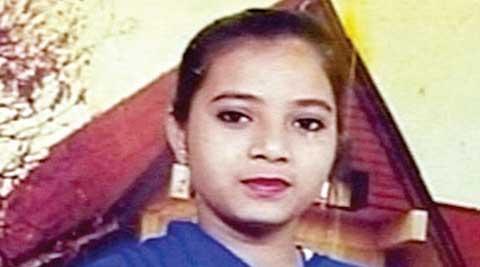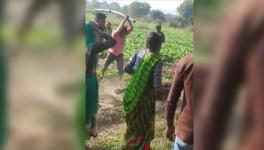Ishrat Jahan ‘Encounter’ Case: Gujarat Police Return Passports to Deceased’s Kin After 17 Years

Image Courtesy: Indian Express
Seventeen years after Javed Sheikh alias Pranesh Pillai was killed in an alleged staged encounter along with Ishrat Jahan and two others in Ahmedabad, the city crime branch handed over the passports of his family.
The handover came following a special CBI court’s order dated June 9, 2021, permitting the passports to be handed over to Sheikh’s wife, son and daughter.
His wife Sajida, daughter Zainab and son Siddique had moved separate applications before the CBI Special Court in Ahmedabad seeking that their passports be returned.
The passports were seized in 2004 by Pune Police after Sheikh, along with three others, were killed in the encounter in the outskirts of Ahmedabad. Later Pune Police had handed over the passports to Gujarat Police’s Ahmedabad crime branch division.
“Following the death of Javed Sheikh in an encounter on June 15, 2004, Pune Police raided his home and seized all documents the family had including ration card, voter identification card, their passports and other certificates. The family had filed the first petition seeking their documents back in 2005. While other documents were returned, police kept the passports,”advocate Shamshad Pathan who represented Sajida, told NewsClick.
He further added, “In 2012, when the case was transferred to CBI, we thought the passports were with the central agency. However, there was no mention of any passport in the CBI chargesheet. Later, when Sajida, Sheikh’s wife wanted to go for Haj and his children wanted to study abroad, we appealed again in April 2021. That is when we came to know that the passports were never handed over to CBI and actually were with the Ahmedabad crime branch.”
Also read: Ishrat Jahan’s Mother Challenges Gujarat Govt’s Refusal to Allow Sanction to Prosecute Top Cops
“CBI did not oppose the plea but added that suitable conditions be imposed. The CBI court of special Judge VR Raval directed that Shaikh’s wife and children shall not leave India without submitting all details including contact numbers and address of where they will stay and details of business including itinerary to the court,” added Pathan.
The Encounter Cases – All Accused Discharged
Ishrat Jahan, Javed Sheikh and two others -- Amjad Ali Rana and Zeeshan Johar were killed near Kotarpur waterworks on the outskirts of Ahmedabad on June 15, 2004, by officers of the Ahmedabad Detection of Crime Branch (DCB), then led by DG Vanzara.
The DCB had then claimed that the four killed were Pakistanis and operatives of the terrorist organisation Lashkar-e-Taiba who were out to kill the then Gujarat Chief Minister Narendra Modi.
The CBI, that took charge of the investigation had filed the first chargesheet in the year 2013 naming seven police officers – PP Pandey, DG Vanzara, NK Amin, JG Parmar, GL Singhal, Tarun Barot of Gujarat cadre and then Assistant Sub-Inspector with State Reserve Police Force Anaju Chaudhary as accused and charged them with murder, abduction, and destruction of evidence among others charges.
Subsequently, in 2014, the CBI filed a supplementary chargesheet, adding four new names of intelligence officials in the list of accused. The chargesheet stated the “fake encounter was a result of the joint operation of the Gujarat Police and Subsidiary Intelligence Bureau (SIB), Ahmedabad”.
However, in May 2019, the special CBI court discharged DG Vanzara and NK Amin in the case, while JG Parmar was abated following his death in September 2020.
The discharge application stated that the Gujarat government, through Additional Chief Secretary of Home department Pankaj Kumar, had declined to grant sanction to the CBI to prosecute the police officers.
Noticeably, the orders to drop the case against Vanzara and Amin were not challenged by the CBI. A move that strengthened and laid the ground for the discharge plea filed by Singhal, Barot and Chaudhary soon after, seeking that the proceedings against them be dropped by the special CBI court.
Also read: Acquittal in Ishrat Jahan Encounter: A Licence to Kill?
However, CBI had sought permission from the Gujarat government to prosecute Singhal, Barot and Chaudhary at the direction of special CBI Judge V R Raval under the Code of Criminal Procedure Section 197 that states that a sanction is required for prosecuting government servants for offences alleged while they were on official duty.
The CBI, through its special public prosecutor RC Kodekar, had opposed the discharge applications of the three policemen primarily on the ground that it is only after the trial begins that one can decide whether the alleged offences were in discharge of an official duty or not.
The court, had stated then that, “In short, a refusal of sanction order is a detailed one and based on the basis of entire material belonging to the case. The order is passed with the application of mind and the government has also come to the conclusion that the offences committed by the present applicants are such which have been committed while discharging their official duties as police officers, and also the investigation against the accused is not proper and there is no evidence against the accused.”
Subsequently, a special CBI court in April 2021 discharged IPS officer GL Singhal, retired police officer Tarun Barot and Anaju Chaudhary stating that, “There was no question of any fake encounter and there was nothing on record to suggest that the victims were not terrorists”.
Singhal, Barot and Chowdhary were the last three accused to be discharged in the encounter cases.
Get the latest reports & analysis with people's perspective on Protests, movements & deep analytical videos, discussions of the current affairs in your Telegram app. Subscribe to NewsClick's Telegram channel & get Real-Time updates on stories, as they get published on our website.
























